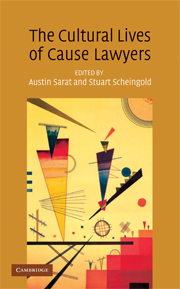Book contents
- Frontmatter
- Contents
- Acknowledgments
- Contributors
- Bringing Cultural Analysis to the Study of Cause Lawyers: An Introduction
- PART I THE CULTURAL WORK OF CAUSE LAWYERS
- PART II THE CULTURAL CONSTRUCTION OF LAWYERS AND THEIR CAUSES
- 4 “They all have different policies, so of course they have to give different news”: Images of Human Rights Lawyers in the British Press
- 5 Ed Fagan and the Ethics of Causes: Who Stole Identity Politics?
- 6 Of Windmills and Wetlands: The Press and the Romance of Property Rights
- 7 “The Kids are Alright”: Cause Lawyering on Television in 1960s America
- 8 Nothing to Believe In – Lawyers in Contemporary Films About Public Interest Litigation
- 9 “Of course he just stood there; he's the law”: Two Depictions of Cause Lawyers in Post-Authoritarian Chile
- 10 Paulina Escobar as Cause Lawyer: “Litigating” Human Rights in the Shadows of Death and the Maiden
- PART III THE CULTURAL RECEPTION OF LAWYERS AND THEIR CAUSES
- Index
7 - “The Kids are Alright”: Cause Lawyering on Television in 1960s America
Published online by Cambridge University Press: 08 January 2010
- Frontmatter
- Contents
- Acknowledgments
- Contributors
- Bringing Cultural Analysis to the Study of Cause Lawyers: An Introduction
- PART I THE CULTURAL WORK OF CAUSE LAWYERS
- PART II THE CULTURAL CONSTRUCTION OF LAWYERS AND THEIR CAUSES
- 4 “They all have different policies, so of course they have to give different news”: Images of Human Rights Lawyers in the British Press
- 5 Ed Fagan and the Ethics of Causes: Who Stole Identity Politics?
- 6 Of Windmills and Wetlands: The Press and the Romance of Property Rights
- 7 “The Kids are Alright”: Cause Lawyering on Television in 1960s America
- 8 Nothing to Believe In – Lawyers in Contemporary Films About Public Interest Litigation
- 9 “Of course he just stood there; he's the law”: Two Depictions of Cause Lawyers in Post-Authoritarian Chile
- 10 Paulina Escobar as Cause Lawyer: “Litigating” Human Rights in the Shadows of Death and the Maiden
- PART III THE CULTURAL RECEPTION OF LAWYERS AND THEIR CAUSES
- Index
Summary
Introduction
CBS's advertisement in Variety touted that its new series for the fall 1970 season, The Storefront Lawyers, would “capture the whole spirit of an exciting, significant movement.” The ad assumed readers would know what this movement was. It wasn't an unreasonable assumption. The movement – the “exciting, significant” movement – had been building over the course of a decade. Beginning in the early years of the 1960s, when lawyers became involved in large numbers with the direct action phase of the civil rights movement, and growing exponentially with the creation of the Legal Services Program, this movement only continued to expand and grow in the later years of the decade. This cause lawyering “explosion” – as I have elsewhere labeled it – neared its zenith in 1970. As the sixties became the seventies, more and more legal professionals were involved in battles against the war in Vietnam, racism, and sexism, as well as with such issues as civil liberties, consumer rights, the environment, and government accountability.
The explosion was the product of an era in which people were questioning the fundamental assumptions of American life and institutions. Many have noted the ways the sixties constituted a period of inquiry about structures of race, of sexuality, of modernity. But the sixties also marked the period in which assumptions about law, lawyers, and the legal profession – law's role in democratic society, lawyers' relationships with clients and to social change, and the legal profession's definitions of how attorneys should do their work – came up for debate and challenge.
- Type
- Chapter
- Information
- The Cultural Lives of Cause Lawyers , pp. 203 - 229Publisher: Cambridge University PressPrint publication year: 2008
- 1
- Cited by



